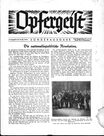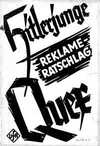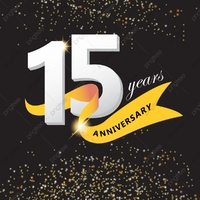GFDN interviews author and collector
William Gillespie
GFDN: Mr. Gillespie, how did your interest in German film, and particularly pre-1945 film, come about?
WG: I was a 20th Century European History Honors student at University in the early 1970s, and this obviously included Germany from its founding as a modern state under Bismarck right up to the end of WWII. In the course of my studies, I became quite fascinated by the vicious propaganda battles between Nazi Germany and the Soviet Union. I was also encouraged by a wonderful History professor who had served in the US Embassy in Moscow in the 1940s and was there when Operation Barbarossa was launched. For instance, he took me to the University Library and pulled the 1954 edition of The Great Soviet Encyclopedia volume “B” off the shelf, and tucked inside was a letter from the Moscow publisher requesting that owners of the Encyclopedia turn to a certain page and then carefully excise that page out and replace it with the new page provided with the letter. That new page was an exact replacement except that it now had an article on the Bering Straits whilst the page being removed had a biographical sketch on Lavrentiy Beria, the former Leader of NKVD, who had been shot when he tried to assume power on Stalin’s death. I was in awe that such a brazen attempt at Orwellian Memory Hole manipulation could be posted worldwide without any qualms and that the fanaticism and uncompromising nature of Soviet Bolshevism was still evident nine years after the defeat of Germany.
The clash of two such hard-core ideologies! Dr. Goebbels ranked Film as a major propaganda platform, and I was keen to see some of those films. But this was in the pre-VHS days and the only film format was 16mm or 35mm, and none of these Nazi films were shown outside of highly restricted educational seminars in West Germany. The book by Isaksson, Politics & Film was published at this time (1971) and was the first book covering Nazi propaganda films that I bought. I still have it. I finally found an American history buff who had served in West Germany as a GI and had somehow managed to obtain a poor-quality VHS copy of Hitlerjunge Quex missing some of the opening credits but intact otherwise. That was the second Nazi film, after Triumph des Willens, that I ever saw, and was the start of my collecting. I was an early customer of International Historic Films which in the late 1970s began selling VHS versions of hundreds of German films. There was at that time also a smaller company called Heidelberg House/German Videos which had a few titles that IHF did not carry. IHF was and remains the premier source of such films today, and their beautifully re-mastered DVDs from 35mm prints have English subtitles, for those who need them. Knock-off pirate prints from the internet are awful, have no bonus materials that IHF specialises in also providing for each film, and there really is no comparison.
GFDN: Could you tell us how did your collection actually start?
WG: Sure. My interest in German film continued after my graduation and a few years later, I went to a militaria/gun show and amongst all the tables was one which had some piled up German literature for sale. One small item caught my attention. A newspaper of some kind was laying there with a page displayed with a B&W image of the film poster for Hitlerjunge Quex. I bought that newspaper for $1 and took it home. My German vocabulary was at that time far less advanced as I had only studied it for one year at university and later on for two summers spent in German language studies near Stuttgart and in Heidelberg respectively, but I was able to read it well enough to realise it was in fact an Ufa film studio special newspaper on the film published for the Hitler Youth. The paper was called Opfergeist — The Spirit of Sacrifice — and is today incredibly rare. For example, none of the German film archives or institutions has a copy. Dr. Horst Claus, the author of the magnificent biography of film director Hans Steinhoff who directed Quex, told me that he worked on his manuscript for seventeen years and in all that time, despite having full uninhibited access to all of the German and Austrian archives, as well as those in the UK and other countries, he was never able to locate a copy of Opfergeist. In my latest book on the film, I reprinted all 8 pages of Opfergeist as a facsimile in both the original German with the corresponding English translation. The book also contains as a 38-page facsimile in both German and English the ultra-rare Ufa “Reklame-Ratschlag" booklet aimed at cinema owners, providing them with a
is today incredibly rare. For example, none of the German film archives or institutions has a copy. Dr. Horst Claus, the author of the magnificent biography of film director Hans Steinhoff who directed Quex, told me that he worked on his manuscript for seventeen years and in all that time, despite having full uninhibited access to all of the German and Austrian archives, as well as those in the UK and other countries, he was never able to locate a copy of Opfergeist. In my latest book on the film, I reprinted all 8 pages of Opfergeist as a facsimile in both the original German with the corresponding English translation. The book also contains as a 38-page facsimile in both German and English the ultra-rare Ufa “Reklame-Ratschlag" booklet aimed at cinema owners, providing them with a  great deal of information, PR material, ready-made newspaper advertisements, synopsis and cast biographies and press quotes on the film after its two premieres in Munich and Berlin, respectively. This booklet is again not found in any German archive. I found it by sheer luck on a militaria auction website, where it was being sold off as part of a Lot of HJ booklets. Without doubt, the seller had no idea of its rarity.
great deal of information, PR material, ready-made newspaper advertisements, synopsis and cast biographies and press quotes on the film after its two premieres in Munich and Berlin, respectively. This booklet is again not found in any German archive. I found it by sheer luck on a militaria auction website, where it was being sold off as part of a Lot of HJ booklets. Without doubt, the seller had no idea of its rarity.
GFDN: As a follow-up question, why Karl Ritter as a subject of now four different books?
WG: Karl Ritter always interested me because he was so easily dismissed as a Nazi propaganda film director in both German and English editions of Third Reich film histories and I thought that there was far more to him than was being presented. I could find out very little about him in those books.
The breakthrough for me was when I read Jay Baird’s To Die for Germany and it had a full chapter on Ritter and his films, but also about him as a man. That chapter led me to pursue a way to go down the path I took over the next decades of collecting film ephemera and posters including a lot of Karl Ritter material.
To me, he was such an obvious choice for a biography. First, there had never been a real biography written on him, other than a short 1940 booklet published in Nazi Germany. He was the only film director from this era who kept a daily diary and added to it snapshots, telegrams and other ephemera to document his work in the German film industry from his Weimar Era days in silent film through to the end of WWII and beyond. His diaries spanned 1911 to 1977.
Then add his recollection of filming part of Besatzung Dora a hundred miles south of the Siege of Leningrad in October 1942, behind Partisan lines in the USSR for a month with 43 Ufa film crew and actors; or his incredible escape from Soviet captivity and certain death for having produced and directed GPU and other anti–Red films, followed by the harrowing and extremely dangerous 23-day-long walk on foot for hundreds of kilometers across Partisan lines in Czechoslovakia in May/June 1945 at age 56, and you have a quite fantastic basis for a biography. It would make an exciting TV mini-series in a perfect world.
Most Third Reich German film directors began their careers in theatre and moved into cinema as it evolved from silent to sound film. Hans Steinhoff is the perfect example. When you study such men, contemporaries of Karl Ritter, these men seemingly had few other interests and to me had quite bland personalities. Ritter, by contrast, was a licenced pilot before WWI; a decorated war veteran in both WWI and WWII, a skilled graphic artist, film poster designer, opera librettist, fluent in both Greek and Latin, a Ufa production leader, film director, scriptwriter, and early NSDAP member (1925). He worked on the German silent versions of Alfred Hitchcock films, worked on three top Rene Clair films in Paris, was Press Chief for Walt Disney Produktion in Germany for two years, and by the time of Hitlerjunge Quex had already worked on, or scripted, produced, or assisted on forty-nine films. He is, in my opinion, without any question the most fascinating Third Reich film director, bar none. Despite his then commitment to National Socialism and the notoriety of his propaganda films, I have no hesitation in considering him a true Renaissance man in command of so many talents and amazing experiences.
Privileged access to Ritter’s unpublished diaries, held by his family in Argentina, allowed me to write the biography, and then the three subsequent books on the banned Luftwaffe film Besatzung Dora, the cancelled Spanish Civil War feature film Legion Condor and the 1933 classic Hitlerjunge Quex. The book on his Legion Condor feature film came about because I had discovered the long–lost Ufa film script in a Berlin Antiquariat in May 2018. Nobody had the script, which seemed to have disappeared after the film was abandoned in August 1939 as collateral damage to the von Ribbentrop–Molotov Pact. It is without doubt the only extant copy. All four books draw on the diaries and private photographs, and Ritter's own words to tell these amazing stories. I also, of course, drew on our vast collection of hundreds of film books and original Ufa publications and film stills and posters to find detailed information on Karl Ritter and his films for these books. Research on the Ritter biography took five years alone. All up, these four titles total over 1,200 pages with over 900 footnotes, over 250 B&W photos/illustrations and 28 colour plates. In all modesty, this Ritter “tetralogy” represents the single-best documentation on the inner workings of any Third Reich producer/director with hundreds of pages of his own diary narrating how such films came about.
GFDN: If Ritter was such an interesting subject, why hadn't a biography on him appeared years earlier than yours did in 2012?
WG: You have to understand that many West German film historians of that era were educated in post-war Marxist saturated universities such as the Freie Universität in Berlin, so readily agreed with their DDR colleagues that there was nothing good about Third Reich cinema and it was – and remains today – not possible to have a career that said otherwise. Historian David Steinitz relates in his 2015 book Geschichte der deutschen Filmkritik how post–WWII film criticism in Germany ushered in an era of film criticism as ideological criticism. That ideological stance still exists today. Many German film historians have sadly retreated into the pre-1933 bubble of German silent film, or focus on exiled Jewish film directors who fled the Third Reich, both of which are far safer topics. This is not a criticism, just an observation. It takes courage to suggest that a Nazi motion picture is actually a well-made film. There are many German film researchers and authors dedicated to the championing of the East German/Soviet Communist film studio DEFA. There are box sets of those propaganda films for sale in German shops, a two-volume 1152 page Lexicon of DEFA films was published two years ago, there is a not–for–profit foundation underwriting such projects. That is the rather sad state of affairs there. I wonder if a PhD thesis should be written examining the fundamental question of the legitimacy of Marxist-trained professors and those who followed the highly influential Frankfurter School of theorists such as Marcuse, Adorno, Benjamin, Kracauer, and later thinkers such as Derrida whose philosophy underpins most modern day writing on National Socialist film? Marxism was the deadly enemy of NS and Fascism so in my opinion their writings on Third Reich film have to be seen as intrinsically biased and ideological by default. Scholarship is meant to be unbiased.
GFDN: What about the fact that you are not a German author?
WG: There are some superb Third Reich film histories written by British and American film historians, so being German is not a prerequisite. It is true that I am not affiliated with a university nor do I hold a PhD, and at times I sometimes felt as an outsider amongst academics and the German Film "Establishment," which I have no doubt looked askance at me and my work in the early years. I just put my head down and learned to decipher and read Sütterlin, in order to read and translate over 1,000 diary pages written by Karl Ritter pertaining to his Ufa films. I have yet to meet a film professor who reads Sütterlin. I have been commended for my Ritter books many times by German film historians --- some of whom are quoted anonymously on this website -- and one of the most common remarks made to me is that only a foreigner could write such books. Horst Claus wrote me and I quote: "It is enthusiastic people like you who generate new ideas and/or dig up materials which correct mistakes. If there is something I have learnt to respect since taking up the "Steinhoff Project" it is the work done by serious collectors who will do everything to enhance their knowledge because they are fully interested in and committed to their subject matter."
GFDN: Your publishing house is not academically linked, and is a self–publisher. Has this detracted from academic journals and university press books from citing your four Karl Ritter–related books?
WG: Not in the least. My books are quoted/cited in dozens of such journals and books. The latest review, in The Historic Journal of Film, Radio & Television on the Quex book actually mentioned this topic. It stated:
"Even if the much-maligned peer review process is far from perfect, it nevertheless ensures a certain degree of quality control and enables the improvement of review shows that there are instances where a self-published book might perhaps be the only way to get this material published to stimulate further research. In this way, the book under review is comparable to other research collections such as the micro-film project by David Culbert on Leni Riefenstahl’s Triumph of the Will in 1986."
GFDN: Any final comments?
WG: My collecting began in 1977 with the $1 Opfergeist newspaper on the film Hitlerjunge Quex, and it seems to have come full circle forty-five years later with my book devoted to that film. I like that notion very much.
GFDN: Thank you.



 is today incredibly rare. For example, none of the German film archives or institutions has a copy. Dr. Horst Claus, the author of the magnificent biography of film director Hans Steinhoff who directed Quex, told me that he worked on his manuscript for seventeen years and in all that time, despite having full uninhibited access to all of the German and Austrian archives, as well as those in the UK and other countries, he was never able to locate a copy of Opfergeist. In my latest book on the film, I reprinted all 8 pages of Opfergeist as a facsimile in both the original German with the corresponding English translation. The book also contains as a 38-page facsimile in both German and English the ultra-rare Ufa “Reklame-Ratschlag" booklet aimed at cinema owners, providing them with a
is today incredibly rare. For example, none of the German film archives or institutions has a copy. Dr. Horst Claus, the author of the magnificent biography of film director Hans Steinhoff who directed Quex, told me that he worked on his manuscript for seventeen years and in all that time, despite having full uninhibited access to all of the German and Austrian archives, as well as those in the UK and other countries, he was never able to locate a copy of Opfergeist. In my latest book on the film, I reprinted all 8 pages of Opfergeist as a facsimile in both the original German with the corresponding English translation. The book also contains as a 38-page facsimile in both German and English the ultra-rare Ufa “Reklame-Ratschlag" booklet aimed at cinema owners, providing them with a  great deal of information, PR material, ready-made newspaper advertisements, synopsis and cast biographies and press quotes on the film after its two premieres in Munich and Berlin, respectively. This booklet is again not found in any German archive. I found it by sheer luck on a militaria auction website, where it was being sold off as part of a Lot of HJ booklets. Without doubt, the seller had no idea of its rarity.
great deal of information, PR material, ready-made newspaper advertisements, synopsis and cast biographies and press quotes on the film after its two premieres in Munich and Berlin, respectively. This booklet is again not found in any German archive. I found it by sheer luck on a militaria auction website, where it was being sold off as part of a Lot of HJ booklets. Without doubt, the seller had no idea of its rarity.